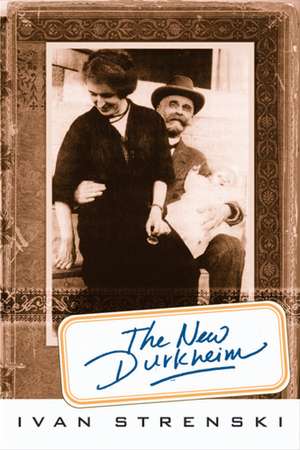The New Durkheim
Autor Ivan Strenskien Limba Engleză Paperback – 20 dec 2006
The French sociologist Emile Durkheim (1858–1917) is considered to be a founding father of several academic disciplines: sociology, anthropology, and religious studies. His books, The Elementary Forms of the Religious Life, Suicide, The Rules of Sociological Method, and The Division of Labor in Society are still required reading for any serious student in these fields.
Religion as the objectification of social ties, ritual as a source of “collective effervescence,” anomie as a force shaping modern suicide—all these are ideas derived from Durkheim. While commonly recognized for these fundamental concepts, however, Durkheim is becoming increasingly known for far more. In recent years, social theorists have begun looking at his work in new ways, situating him in the social, intellectual, and cultural context of his time.
Ivan Strenski, a leading figure in this reexamination, brings together a collection of his own essays to demonstrate the fruitful ways that Durkheimian perspectives can be applied to contemporary issues. Chapters focus on a wide range of topics, including sacrifice, religion, animal rights, and terrorism. Strenski concludes by linking the revitalization of Durkheimian social theory with an exciting new approach to teaching his texts and ideas. This book will be essential reading for scholars in religious studies, anthropology, and sociology.
Religion as the objectification of social ties, ritual as a source of “collective effervescence,” anomie as a force shaping modern suicide—all these are ideas derived from Durkheim. While commonly recognized for these fundamental concepts, however, Durkheim is becoming increasingly known for far more. In recent years, social theorists have begun looking at his work in new ways, situating him in the social, intellectual, and cultural context of his time.
Ivan Strenski, a leading figure in this reexamination, brings together a collection of his own essays to demonstrate the fruitful ways that Durkheimian perspectives can be applied to contemporary issues. Chapters focus on a wide range of topics, including sacrifice, religion, animal rights, and terrorism. Strenski concludes by linking the revitalization of Durkheimian social theory with an exciting new approach to teaching his texts and ideas. This book will be essential reading for scholars in religious studies, anthropology, and sociology.
Preț: 242.48 lei
Preț vechi: 302.09 lei
-20% Nou
Puncte Express: 364
Preț estimativ în valută:
46.40€ • 50.39$ • 38.98£
46.40€ • 50.39$ • 38.98£
Carte indisponibilă temporar
Doresc să fiu notificat când acest titlu va fi disponibil:
Se trimite...
Preluare comenzi: 021 569.72.76
Specificații
ISBN-13: 9780813538945
ISBN-10: 0813538947
Pagini: 384
Dimensiuni: 152 x 229 x 20 mm
Greutate: 0.51 kg
Ediția:None
Editura: Rutgers University Press
Colecția Rutgers University Press
ISBN-10: 0813538947
Pagini: 384
Dimensiuni: 152 x 229 x 20 mm
Greutate: 0.51 kg
Ediția:None
Editura: Rutgers University Press
Colecția Rutgers University Press
Notă biografică
Ivan Strenski is Holstein Family Community Professor of Religious Studies at the University of California, Riverside, and the former editor of the journal Religion.
Cuprins
PART ONE Introduction
So Much More Durkheim
PART TWO Turning the Philosophical Ground
Durkheim, Hamelin, and the ``French Hegel''
The Ironies of Fin-de-Siecle Rebellions against Historicism and Empiricism in the Ecole Pratique des Hautes Etudes, Fifth Section
PART THREE The Vagaries of Religious Belonging
Durkheim, Judaism, and the Afterlife
Zionism, Brahminism, and the Embodied Sacred: What Durkheimians Owe to Sylvain Levi
The Rise of Ritual and the Hegemony of Myth: Sylvain Levi, the Durkheimians, and Max Muller
Durkheim, Hubert, and the Clerical Modernist Discourse on Symbolism
PART FOUR Institutions and Other Afflictions Durkheim, Disciplinarity, and the ``Sciences Religieuses''
Liberal Protestant Theology and/or ``Science Religieuse''
The Durkheimians and the Protestants in the Ecole Pratique, Fifth Section: The Dark Side
PART FIVE Politics and Pedagogy Today
Durkheim Sings: Teaching the ``New Durkheim'' on Religion
Christians, Durkheimians, and Other Animals
Sacrifice, Gift, and the Social Logic of Muslim ``Human Bombers''
A Durkheimian Text in Turkey: Ziya Gokalp, Huseyin Nail Kubali, and Muslim Civil Society
Notes
References
Index
So Much More Durkheim
PART TWO Turning the Philosophical Ground
Durkheim, Hamelin, and the ``French Hegel''
The Ironies of Fin-de-Siecle Rebellions against Historicism and Empiricism in the Ecole Pratique des Hautes Etudes, Fifth Section
PART THREE The Vagaries of Religious Belonging
Durkheim, Judaism, and the Afterlife
Zionism, Brahminism, and the Embodied Sacred: What Durkheimians Owe to Sylvain Levi
The Rise of Ritual and the Hegemony of Myth: Sylvain Levi, the Durkheimians, and Max Muller
Durkheim, Hubert, and the Clerical Modernist Discourse on Symbolism
PART FOUR Institutions and Other Afflictions Durkheim, Disciplinarity, and the ``Sciences Religieuses''
Liberal Protestant Theology and/or ``Science Religieuse''
The Durkheimians and the Protestants in the Ecole Pratique, Fifth Section: The Dark Side
PART FIVE Politics and Pedagogy Today
Durkheim Sings: Teaching the ``New Durkheim'' on Religion
Christians, Durkheimians, and Other Animals
Sacrifice, Gift, and the Social Logic of Muslim ``Human Bombers''
A Durkheimian Text in Turkey: Ziya Gokalp, Huseyin Nail Kubali, and Muslim Civil Society
Notes
References
Index
Recenzii
Strenski is not only one of the leading figures in the field of religious studies, but also a good, captivating storyteller. These flowing and engaging essays skillfully navigate both sociological and historical work to give us a very fresh, lively, and original account of Durkheim's thought and the influences that shaped it.
Descriere
Ivan Strenski, a leading figure in this reexamination, brings together a collection of his own essays to demonstrate the fruitful ways that Durkheimian perspectives can be applied to contemporary issues. Chapters focus on a wide range of topics, including sacrifice, religion, animal rights, and terrorism. Strenski concludes by linking the revitalization of Durkheimian social theory with an exciting new approach to teaching his texts and ideas. This book will be essential reading for scholars in religious studies, anthropology, and sociology.
